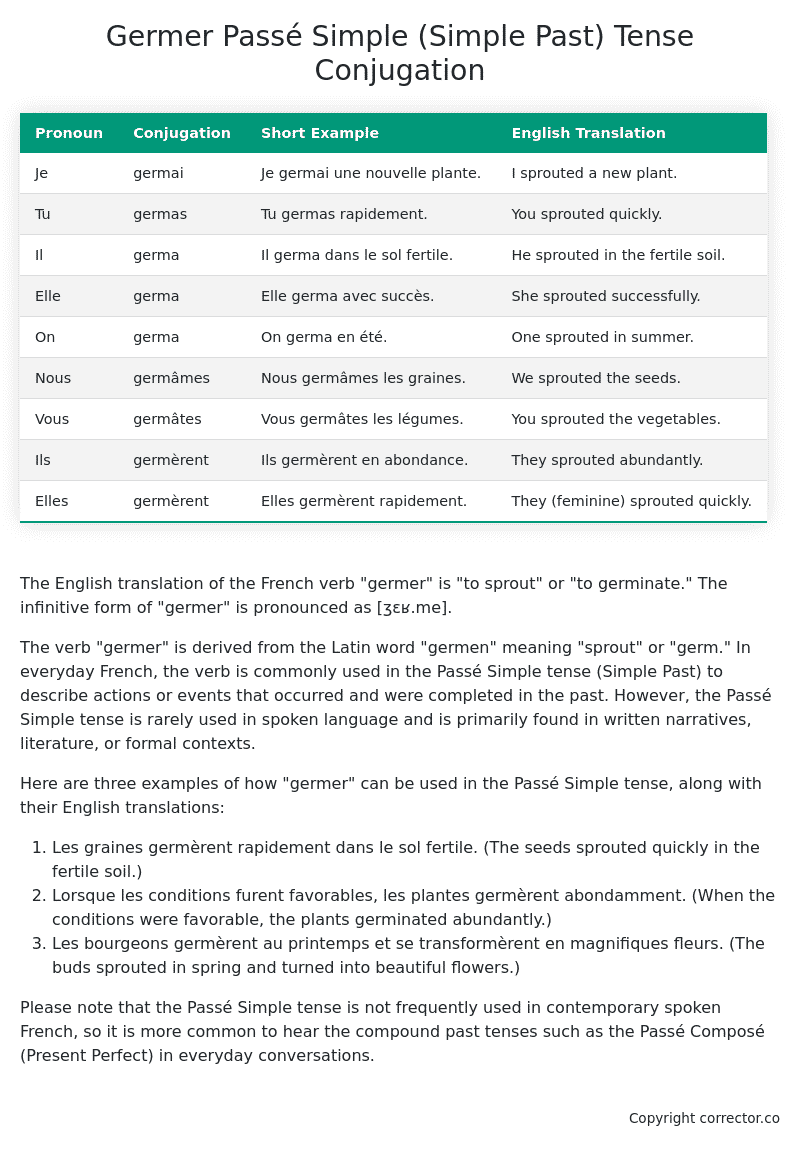Passé Simple (Simple Past) Tense Conjugation of the French Verb germer
Introduction to the verb germer
The English translation of the French verb “germer” is “to sprout” or “to germinate.” The infinitive form of “germer” is pronounced as [ʒɛʁ.me].
The verb “germer” is derived from the Latin word “germen” meaning “sprout” or “germ.” In everyday French, the verb is commonly used in the Passé Simple tense (Simple Past) to describe actions or events that occurred and were completed in the past. However, the Passé Simple tense is rarely used in spoken language and is primarily found in written narratives, literature, or formal contexts.
Here are three examples of how “germer” can be used in the Passé Simple tense, along with their English translations:
- Les graines germèrent rapidement dans le sol fertile. (The seeds sprouted quickly in the fertile soil.)
- Lorsque les conditions furent favorables, les plantes germèrent abondamment. (When the conditions were favorable, the plants germinated abundantly.)
- Les bourgeons germèrent au printemps et se transformèrent en magnifiques fleurs. (The buds sprouted in spring and turned into beautiful flowers.)
Please note that the Passé Simple tense is not frequently used in contemporary spoken French, so it is more common to hear the compound past tenses such as the Passé Composé (Present Perfect) in everyday conversations.
Table of the Passé Simple (Simple Past) Tense Conjugation of germer
| Pronoun | Conjugation | Short Example | English Translation |
|---|---|---|---|
| Je | germai | Je germai une nouvelle plante. | I sprouted a new plant. |
| Tu | germas | Tu germas rapidement. | You sprouted quickly. |
| Il | germa | Il germa dans le sol fertile. | He sprouted in the fertile soil. |
| Elle | germa | Elle germa avec succès. | She sprouted successfully. |
| On | germa | On germa en été. | One sprouted in summer. |
| Nous | germâmes | Nous germâmes les graines. | We sprouted the seeds. |
| Vous | germâtes | Vous germâtes les légumes. | You sprouted the vegetables. |
| Ils | germèrent | Ils germèrent en abondance. | They sprouted abundantly. |
| Elles | germèrent | Elles germèrent rapidement. | They (feminine) sprouted quickly. |
Other Conjugations for Germer.
Le Present (Present Tense) Conjugation of the French Verb germer
Imparfait (Imperfect) Tense Conjugation of the French Verb germer
Passé Simple (Simple Past) Tense Conjugation of the French Verb germer (You’re reading it right now!)
Passé Composé (Present Perfect) Tense Conjugation of the French Verb germer
Futur Simple (Simple Future) Tense Conjugation of the French Verb germer
Futur Proche (Near Future) Tense Conjugation of the French Verb germer
Plus-que-parfait (Pluperfect) Tense Conjugation of the French Verb germer
Passé Antérieur (Past Anterior) Tense Conjugation of the French Verb germer
Futur Antérieur (Future Anterior) Tense Conjugation of the French Verb germer
Subjonctif Présent (Subjunctive Present) Tense Conjugation of the French Verb germer
Subjonctif Passé (Subjunctive Past) Tense Conjugation of the French Verb germer
Subjonctif Imparfait (Subjunctive Imperfect) Tense Conjugation of the French Verb germer
Subjonctif Plus-que-parfait (Subjunctive Pluperfect) Tense Conjugation of the French Verb germer
Conditionnel Présent (Conditional Present) Tense Conjugation of the French Verb germer
Conditionnel Passé (Conditional Past) Tense Conjugation of the French Verb germer
Conditionnel Passé II (Conditional Past II) Tense Conjugation of the French Verb germer
L’impératif Présent (Imperative Present) Tense Conjugation of the French Verb germer
L’impératif Passé (Imperative Past) Tense Conjugation of the French Verb germer
L’infinitif Présent (Infinitive Present) Tense Conjugation of the French Verb germer
L’infinitif Passé (Infinitive Past) Tense Conjugation of the French Verb germer
Le Participe Présent (Present Participle) Tense Conjugation of the French Verb germer
Le Participe Passé (Past Participle) Tense Conjugation of the French Verb germer
Struggling with French verbs or the language in general? Why not use our free French Grammar Checker – no registration required!
Get a FREE Download Study Sheet of this Conjugation 🔥
Simply right click the image below, click “save image” and get your free reference for the germer Passé Simple tense conjugation!

Germer – About the French Passé Simple (Simple Past) Tense
Formation
Usage
Narration
Historical Context
Interactions with other tenses
Passé Composé
Imparfait
Conditional and Subjunctive
Summary
I hope you enjoyed this article on the verb germer. Still in a learning mood? Check out another TOTALLY random French verb conjugation!


